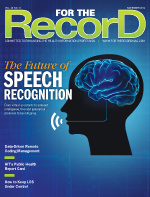November  2016
2016
Two-Faced Technology
By Lee DeOrio
For The Record
Vol. 28 No. 11 P. 3
As any fan of the stellar anthology series Black Mirror can tell you, technology is often a double-edged sword. It may seem super cool that science can surgically implant a "grain" into your neck that will allow you to relive memories at will. However, when that same technology allows you to analyze every detail of the dinner conversation between your wife and an old acquaintance, you may wish you were "grainless."
This notion struck me when I read news that engineers have developed a small monitoring device, worn on the skin, that measures alcohol levels in perspiration. Unlike similar technologies that take between two and three hours to measure alcohol levels, this patch takes only eight minutes to send data to the user's smartphone.
It's easy to imagine how this "wearable tattoo" can be a game-changer. Partygoers concerned about whether they've had too much to drink have the definitive answer right on their smartphones—the same device they can use to flag a ride home. Also, patients with health concerns exacerbated by alcohol can easily monitor whether they're pushing their limits.
Despite these benefits, I can envision how the purpose of this well-meaning technology could take a turn for the worse. For example, imagine how it would play out on college campuses, a setting known to be prone to alcohol consumption and where drinking games are more common than skipping late Friday classes. "How much can you raise your alcohol level in 10 minutes?" "First one to 1.5 wins." "Stop! Everyone measure your alcohol level. Low man chugs."
It reminds me of how many health care professionals view EHRs, a technology whose goal is to improve care and make life easier on physicians. However, many users believe EHRs have serious design flaws that have created undesired consequences, including a stubbornness to exchange data and a willingness to produce lousy documentation. Then there's patient safety, an issue that's been difficult to document, although there appears to be a groundswell of support for a national moderating system.
In general, new technologies create a buzz, an enthusiasm for a brighter future. Still, before introducing the latest and greatest, whether it be a groundbreaking tool to measure alcohol levels, an EHR, or a memory-device implant, it's best to take a step back to consider the possibility of unwanted side effects.



